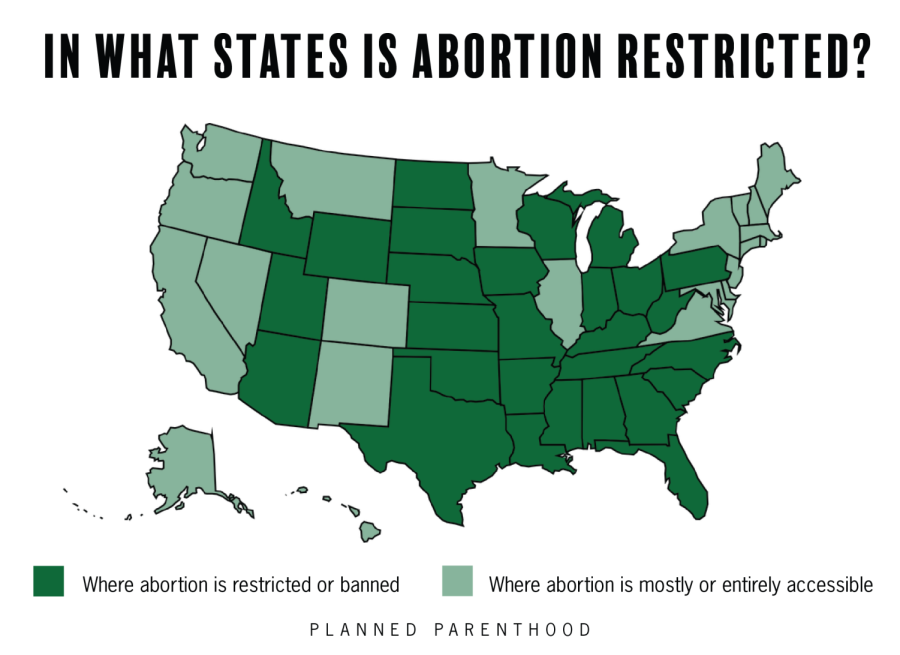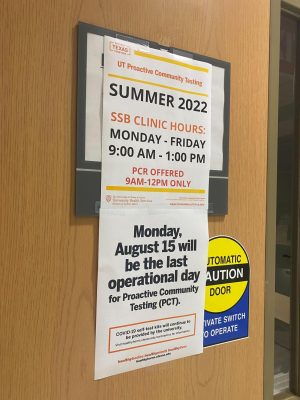‘It’s so hard to just do my job’: Abortion restrictions threaten UT, state OB-GYN residency program
August 9, 2022
Editor’s Note: This article first appeared in the August 9, 2022 flip book. A previous version of this article said that medical schools must offer abortion training to remain accredited, but it has been updated to reflect that residency programs must offer the training, not medical schools. The Texan regrets this error.
In addition to impacting patients seeking an abortion, OB-GYN residents in Texas say the state’s restrictive abortion laws have complicated the way they are trained in medical residency programs.
Residency programs must offer abortion training to OB-GYN residents in order to remain accredited, according to the program requirements for the Accreditation Council for Graduate Medical Education. But in Texas, abortion is banned in all cases except when the mother’s life is at risk since Roe v. Wade was overturned, and the state’s “trigger law” that goes in effect Aug. 25 will make providing an abortion punishable by up to a $100,000 fine and life in prison. The ban has caused UT to send its residents to California for abortion training.
One Texas OB-GYN resident, who is being kept anonymous because of restrictions from her residency program that fears backlash from the state, said training in Texas has been severely impacted since a law effectively banning abortion at six weeks passed last September.
“(Residents) still want to get the training, but it’s so demeaning,” the resident said. “It’s so hard, emotionally, to push forward and go through the extra training to be an abortion care provider because there’s just so much stigma. People hate you. People give you death threats.”
The ACGME held a comment period for a proposed set of revisions to accreditation requirements, which closed Monday. The new policy would require programs in states where abortion is illegal to offer alternative opportunities in other jurisdictions where residents can legally receive training, as Dell Medical School is doing with California.
“To comply with Texas state law and national accreditation standards, Dell Med offers its OB-GYN residents the opportunity to receive this training in California,” said a Dell Medical School spokesperson in an emailed statement. “Residents may opt out of this training.”
Dell Med referred all requests for comment to their media representative, who did not respond to The Daily Texan’s requests to interview residents or faculty from the OB-GYN program.
In a report from the American Association of Medical Colleges, UT assistant professor of women’s health Lauren Thaxton was quoted saying that the decision to overturn Roe would impact every level of medical education, but that it would take time to figure out the potential “generational” impacts.
In the AAMC report, Thaxton described using a watermelon to provide simulation training for dilation and evacuation, a procedure that is used for both miscarriages and abortions.
Thaxton also said she is worried about the strain placed on educators in states where abortion remains legal who will face an influx of patients.
The OB-GYN resident said before Texas’s restrictions went into place, she received abortion training in the state that gave her a unique understanding of what goes into the decision to get an abortion and how important the procedure is for her patients. Now, she said residents that have arrived after her won’t have access to the same training in Texas.
“We’re getting limited experience to help take care of women who may need this procedure,” the resident said. “That can be dangerous to have a group of OB-GYN physicians who can’t perform a procedure that could be life-saving in certain scenarios.”
The resident said she believes Texas’ abortion laws will make it harder for OB-GYN residency programs to recruit doctors to Texas.
Nikita Kakkad, a biomedical engineering and Plan II junior, said she plans to go to medical school and become an abortion provider, but Roe v. Wade being overturned has affected where she will go.
“The only way you get that training is if you’re in a state where people can get abortions,” Kakkad said. “That’s really gonna guide where I want to go to medical school.”
The OB-GYN resident said the exhaustion and frustration of seeing patients suffer has pushed her to question whether she can remain in Texas after her residency.
“On the flip side of that, if everybody leaves, there’s no one left to fight for our patients,” she said. “There’s no one left to care for those millions of women that are here. They still deserve good doctors too. It’s not their fault.”















